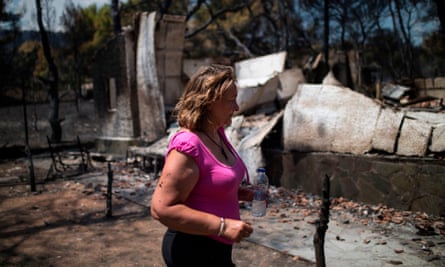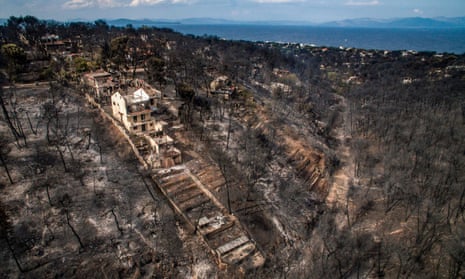Three weeks after wildfires wrought unprecedented death and destruction outside Athens, Greeks worldwide have rallied to help their brethren.
From Australia to the US, diaspora communities have been galvanised, their churches gathering collections, their charities raising funds, their media making appeals in an extraordinary display of solidarity. With the death toll climbing to 94 and hundreds facing ruination, the fires are now the worst Greek disaster in living memory.
“Everyone has been enormously affected,” said Bill Papastergiadis, who heads the 300,000-strong Greek community in Melbourne, which has the largest Greek population of anywhere outside Greece, among a total diaspora estimated to be about 7 million. “The outpouring of grief has been immense, but so has the support across Australia.”
Within 12 hours of the news reaching the Australian city, Papastergiadis had called the Greek foreign minister and the ambassador in Canberra, contacted Australia’s ministers for immigration and multiculturalism, opened emergency bank accounts and raised awareness through local Greek-language media. The response was as overwhelming as it was instant. As the disaster played out over 9,000 miles (14,500km) away – with the country plunged into three days of national mourning as rescue services combed the land and sea for the missing – donations began pouring in.
“In the first week, half a million dollars had been raised,” said the lawyer, who hopes to collect more funds when Melbourne’s Greek community centre holds a major radiothon with the national broadcaster, ABC, this Wednesday. “The response from the federal and state government was just as instantaneous. Within 48 hours they were offering assistance, and teams with specialist fire-fighting expertise had been sent to help.”
Meanwhile in the US, ethnic Greeks were also rallying. Home to nearly 3 million citizens of Greek heritage, its diaspora community is not only the largest globally, but one of the wealthiest.
Within 24 hours, relief funds had been launched. Greek Hollywood royalty including Nia Vardalos, the writer and star of My Big Fat Greek Wedding, and Rita Wilson, the actor and singer (and wife of Tom Hanks), who is also of Greek descent, had quickly weighed in with appeals.
Again, the response was instantaneous, with the scale of the tragedy tugging at the heartstrings of people who, like Wilson and Hanks, have second homes in Greece. “In the face of unspeakable devastation there is hope,” said George Stamas, the board president of the New York-based Hellenic Initiative, a global charity representing Greeks in the US, Australia, Canada and Europe. “The world diaspora has come together as one and to support the efforts of all those working to rebuild shattered lives and families.”
Like other philanthropic organisations in the diaspora, the Hellenic Initiative was established during Greece’s economic crisis. The support has highlighted the strong bonds and emotional ties diaspora Greeks have for a country variously seen as motherland and birthplace of forefathers forced to leave through poverty and war. The US, Canada and Australia attracted hundreds of thousands of Greek migrants throughout the 20th century, with numbers peaking after Greece’s 1946-49 civil war.

But the relationship has not always been easy. Anger at the perceived ineptitude of a corrupt and unwieldy Greek state has also loomed large as diaspora communities have watched the country’s descent into bankruptcy with a mix of shock and disbelief. The failure of successive Greek governments to extend voting rights to communities abroad has also fuelled disappointment.
“There has been an accumulation of mistrust in the efficiency and integrity of Greek institutions, especially around managing funds,” said Antonis Kamaras, a researcher at Oxford University’s Greek Diaspora Project. “Many have the impression that in the past, [relief] funds have been misallocated. But when you see your own being burned to death, there is an affinity of blood and it is very strong.”
The leftist-led Greek government has appointed a tripartite committee of ministers, overseen by a team of auditors, to manage aid earmarked for the area’s rehabilitation, including that raised by the diaspora.
More than 1,500 homes were razed when fires, fanned by gale-force winds, ravaged areas east of Athens, obliterating the coastal resort of Mati in a matter of hours.
Papastergiadis said he planned to fly to Athens, with cheques in his pocket, in September.
Australian Greeks, he said, wanted at least some funds to go towards the Union of Hellenic Fire Service Volunteers, a volunteer group in dire need of basic necessities including outfits and boots. “A committee will be formed to determine where the money goes. We want to be sure that what is raised is used appropriately and goes to the appropriate persons in need.”
